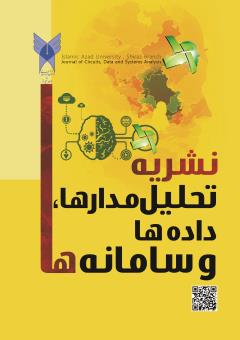بررسی وشبیه سازی طرح کنترل توان در سیستم های مخابراتی برداشت کننده انرژی
محورهای موضوعی : مهندسی مخابراتنصراله بیات 1 , آذر محمودزاده 2 * , فاطمه صفایی 3
1 - گروه آموزشی برق،دانشکده برق،دانشگاه غیرانتفاعی،شیراز،ایران
2 - گروه مهندسی برق، واحد شیراز، دانشگاه آزاد اسلامی، شیراز، ایران
3 - گروه برق دانشکده برق والکترونیک دانشگاه غیر انتفاعی شیراز ایران
کلید واژه: برداشت انرژی از محیط, ظرفیت محدود باتری, کانال محوشدگی , مخابرات بیسیم, بهینهسازی توان.,
چکیده مقاله :
در مقاله پیشرو، تلاش ما بر این است تا سیستمهای مخابراتی برداشتکننده انرژی دارای یک فرستنده، یک گیرنده را، برای یک کانال مخابراتی نویز گوسی سفید جمعشونده دارای محوشدگی مورد مطالعه قراردهیم . انرژیهای برداشتشده و محوشدگی کانال، فرایندهای مستقل وبهطور یکسان توزیع شده هستند و اطلاعات درباره انرژیهای برداشتشده و بهره کانال بهصورت ع ل ی در اختیار فرستنده قرار میگیرد. فرستنده به یک باتری قابل شارژ با ظرفیت ذخیره محدود مجهز شده است . هدف ما به دست آوردن یک طرح کنترل توان برخط است بهگونهای که متوسط نرخ ارسال داده را روی یک بازه مخابراتی با طول نامحدود بیشینه نماید.یک الگوریتم با پیچیدگی کم مبتنی بر بهینهسازی محدب آنلاین برای تضمین در دسترس بودن انرژی گره برداشتکننده انرژی و به حداکثر رساندن متوسط نرخ ارسال داده طولانیمدت پیشنهاد شده است. الگوریتم پیشنهادی، حداکثر توان انتقال را با اطلاع از وضعیت شارژ محدود میکند و توان انتقال را بر اساس اطلاعات تاریخی تخصیص میدهد. شبیهسازیهایی برای نشان دادن اثربخشی الگوریتم با در نظر گرفتن انرژی ورودی با توزیعهای متفاوت، همچنین ضرایب کانال با توزیعهای مختلف انجام شدهاست. الگوریتم پیشنهادی نسبت به همتایان خود در نرخهای برداشتکننده انرژی متفاوت، بهتر عمل میکند.
In the upcoming research, our effort is to study energy-harvesting telecommunication systems with one transmitter-one receiver for a Gaussian white noise telecommunication channel with fading. Harvested energies and channel fading are independent and identically distributed processes, and information about harvested energies and channel gain is causally provided to the transmitter. The transmitter is equipped with a rechargeable battery with limited storage capacity.Our goal is to obtain an online power control scheme that maximizes the average data transmission rate over a telecommunication interval of unlimited length. A low-complexity algorithm based on online convex optimization is proposed to guarantee the energy availability of the energy harvesting node and to maximize the long-term average data transmission rate. The proposed algorithm limits the maximum transmission power by knowing the state of charge and allocates the transmission power based on historical information. Simulations have been performed to show the effectiveness of the algorithm by considering input energy with different distributions, as well as channel coefficientswith different distributions. The proposed algorithm performs better than its peers in different energy harvesting rates.

